| Srl | Item |
| 1 |
ID:
087058
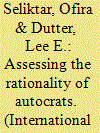

|
|
|
|
|
| Publication |
2009.
|
| Summary/Abstract |
In 1960, Thomas Schelling warned that.. petty dictators may soon have the ability to startle us out wits with a nuclear explosion somewhere.Although nearly a half-century has passed since Schelling wrote those words, the anxiety which they reflect is undiminished, especially concerning autocratic rulers of rogue states.
|
|
|
|
|
|
|
|
|
|
|
|
|
|
|
|
| 2 |
ID:
095091
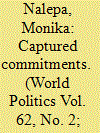

|
|
|
|
|
| Publication |
2010.
|
| Summary/Abstract |
How can outgoing autocrats enforce promises of amnesty once they have left power? Why would incoming opposition parties honor their prior promises of amnesty once they have assumed power and face no independent mechanisms of enforcement? In 1989 autocrats in a number of communist countries offered their respective oppositions free elections in exchange for promises of amnesty. The communists' decision appears irrational given the lack of institutions to enforce these promises of amnesty. What is further puzzling is that the former opposition parties that won elections in many countries actually refrained from implementing transitional justice measures. Their decision to honoring their prior agreements to grant amnesty seems as irrational as the autocrats' decisions to place themselves at the mercy of their opponents. Using an analytic narrative approach, the author explains this paradox by modeling pacted transitions not as simple commitment problems but as games of incomplete information where the uninformed party has "skeletons in its closet"-that is,embarrassing information that provides insurance against the commitments being broken. The author identifies the conditions under which autocrats step down even though they can be punished with transitional justice and illustrates the results with case studies from Czechoslovakia, Poland, and Hungary.
|
|
|
|
|
|
|
|
|
|
|
|
|
|
|
|
| 3 |
ID:
112115
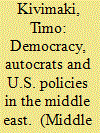

|
|
|
| 4 |
ID:
186796
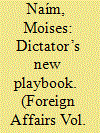

|
|
|
| 5 |
ID:
157552
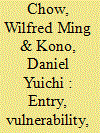

|
|
|
|
|
| Summary/Abstract |
Why are some autocracies more open to trade than others? And why are autocratic trade policies so volatile? Despite wide variation in how autocracies approach international trade, existing research offers few answers to these questions. We argue that the trade policies of autocratic regimes depend in part on the mode of entry of their leaders. Autocrats can enter power either legally—according to established rules of succession—or extralegally, through a palace revolt or coup. These different modes of entry lead to different posttransition politics and trade policies. Because new extralegal leaders are outsiders with limited resources, they are vulnerable to coups by other ruling elites. They reduce this vulnerability by building public support via lower tariffs. However, as they consolidate their rule, they reverse these initial tariff cuts. Extralegal entries thus lead to foreign economic policies that are more “cooperative” in the short run but more volatile in the long run.
|
|
|
|
|
|
|
|
|
|
|
|
|
|
|
|